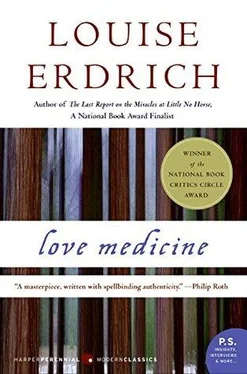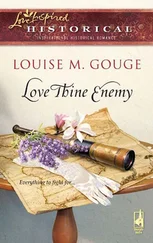Louise Erdrich - Love Medicine
Здесь есть возможность читать онлайн «Louise Erdrich - Love Medicine» весь текст электронной книги совершенно бесплатно (целиком полную версию без сокращений). В некоторых случаях можно слушать аудио, скачать через торрент в формате fb2 и присутствует краткое содержание. Год выпуска: 2005, Издательство: Harper Perennial Modern Classics, Жанр: Современная проза, на английском языке. Описание произведения, (предисловие) а так же отзывы посетителей доступны на портале библиотеки ЛибКат.
- Название:Love Medicine
- Автор:
- Издательство:Harper Perennial Modern Classics
- Жанр:
- Год:2005
- ISBN:нет данных
- Рейтинг книги:3 / 5. Голосов: 1
-
Избранное:Добавить в избранное
- Отзывы:
-
Ваша оценка:
- 60
- 1
- 2
- 3
- 4
- 5
Love Medicine: краткое содержание, описание и аннотация
Предлагаем к чтению аннотацию, описание, краткое содержание или предисловие (зависит от того, что написал сам автор книги «Love Medicine»). Если вы не нашли необходимую информацию о книге — напишите в комментариях, мы постараемся отыскать её.
Love Medicine — читать онлайн бесплатно полную книгу (весь текст) целиком
Ниже представлен текст книги, разбитый по страницам. Система сохранения места последней прочитанной страницы, позволяет с удобством читать онлайн бесплатно книгу «Love Medicine», без необходимости каждый раз заново искать на чём Вы остановились. Поставьте закладку, и сможете в любой момент перейти на страницу, на которой закончили чтение.
Интервал:
Закладка:
Drawn by the bright flames, they’d come helplessly to burn.
That fated night the boys, all except for the youngest, Lyman, were off in town hanging at the outskirts of a large jackpot bingo.
I left Lyman home just for a moment and went down across the road to Florentine’s house to trade some commodity rice she had extra and would give me in exchange for cigarettes and powdered eggs. We had a cup of coffee while I was there. We talked of this and that. It was the chance they were watching my house to take.
When she poured the second cup I saw the flames shooting out of the black liquid as it streamed from the pot. I got up and left without saying good-bye. To this day she tells how Lamartine saw her house was burning in the pour of her coffee.
She doesn’t know I saw it first in Kashpaw’s eyes.
She doesn’t know what I saw when I got in eyeshot of my yard.
Smoke had unrolled from the windows and wrapped itself into a giant tube that fled straight toward heaven in that cloudless, windless dusk.
I threw rice in the air like a hundred weddings and took to my heels.
Already voices had stopped behind me, shouting on the road. I ran in a beeline wasting no breath, no time. I’d left Lyman sleeping in that house with the radio going in his ear.
I ran straight in the door.
Of course I choked. I got down on my hands and knees, crawling like a toddler baby in and out the rooms under burdensome heat. Smoke. The roof was ‘just about to cave and Lyman wasn’t nowhere to be found. Yet a mother’s heart was certain that her son was in the house. I stopped underneath my table to get my bearings, and then I knew. Sometimes he would go inside my private closet and lay against my clothes and shoes.
He liked the dark of it, I guess. The woman smells of cloth and perfumes.
Sometimes after I’d come home he would be sleeping on my closet floor.
I crawled in there. He was nuzzled in my nightgowns, overcome. I guess I heaved him out the bedroom window and fell after him into the hollyhocks. The tribal fire trucks were all broken down at the time.
That was their plan.
And so, after all of us were safe, there was nothing to do but stand and watch it burn.
How come we’ve got these bodies? They are frail supports for what we feel. There are times I get so hemmed in by my arms and legs I look forward to getting past them. As though death will set me free like a traveling cloud. I’ll get past the ragged leaves that dead burn of my youth looked into. I’ll be out there as a piece of the endless body of the world feeling pleasures so much larger than skin and bones and blood.
After the house burnt to blackened sticks they came around. My people.
“Lamartine,” they said. “Poor Lulu. Come stay with us, Will you?”
“No,” I said. “I’m going to live right here.”
And I did live on the very spot where the house had stood. For two months we camped there in a shack made out of bent sheets of tin siding, busted boards, burnt wood. We hauled water in cans. The summer was dry and hot. In the hulks of our busted down cars my boys slept comfortably and well. People brought us food and beer. The Sisters gave us clothes. But we lived there like a pack of wild animals, and after a while it became a disgrace even to those who did not know the meaning of disgrace. The tribe finally built a cracker box government house for us.
They put it on a strip of land rightfully repurchased from a white farmer. That land was better than Henry’s, even, with a view overlooking town. From there I could see everything.
I accepted their restitution.
Time went fleetingly by until every one of my boys was a grownup man.
Some did me grief, though I was proud of them. Gerry was one. In and out of prison, yet inspiring the Indian people, that was his life.
Like myself he could not hold his wildness in.
The other one who went wild on me was unexpected. That was Henry junior. All his life he did things right, and then the war showed him right was wrong. Something broke in him. His mind gave way. He was past all touch when he returned. I would catch his gaze sometimes and think I recognized it from somewhere.
One day I knew. He had the same dead wide stare as the man in my playhouse. It did not surprise me so much, then, to hear the words on Lyman’s mouth the day he hitchhiked from the river.
“It was an accident,” Lyman said, coming in the door. He looked half gone himself. I threw an afghan on his shoulders.
“Don’t say nothing.” I led him over to a chair. He sat in shock.
“The car went in,” he said. “Out of control.” There was a false note in his voice, and I knew he had planned to say this. I also knew that no accident would have taken Henry junior’s life, not after he had the fortune to get through a war and a prison camp alive.
But like the time they came to tell me the news of Henry Senior, I said nothing. I knew what people needed to believe.
For a while after Henry junior died, Lyman was affected. He had always been carefree, a lover of nice things and ironed clothes like myself, with the golden touch for money from his father. He got morose. He could not snap out of it but slowly improved his outlook by working. He became a contractor, hired on his brothers, and in that way supported us all.
And so we stuck together on that strip of land that was once sun beat and bare of trees. Wives and children, in-laws, cousins, all collected there in trailers and more old car hulks. Box elder trees and oak scrub were planted and grew up. We even had a gooseberry patch. It became a regular nest of Lamartines. I’d had my first daughter, my last child, when I was almost fifty years old.
Bonita’s father was a Mexican who followed the sugar beet harvests.
That’s why her name was a little different. Our life went on. We saw the factory go up and then fall as it was meant to.
Nobody cared whose land it stood on anymore. Even the biggest problems got long lost in time, careful time, that undid us all, like Kashpaw’s hands with their flowered lies.
When I was over sixty-five and losing my sight, I had strings pulled to get a little two-room at the Senior Citizens. For years I’d just had the junk other people pawned off on me. Bouquets of plastic flowers that looked like they’d faded over graves, dishes of stained green plastic, clothes that went two for a quarter in the Bundles. I threw it all out and started over fresh. My apartment — had painted block walls.
I bought pictures of trees, dancers, wolves, and John Kennedy. I bought the classic called Plunge of the Brave, which everyone had whether they liked Kashpaw and wanted to venerate his youth, or did not like him and therefore made fun of his naked leap.
My boys went in together and bought me furniture. A match law ing set.
And then, after my new plush rocker was set in the middle of the room, after they brought in my radio and straightened the place around, after my boys toasted me with beers and left for the Lamartine homesite once more, I sat there. I felt the liquid golden last days of my oats.
And that is where the second half of this story starts.
I had nothing to do with the fact that Nector Kashpaw went foolish.
He had brains and heart to spare but never had to use them for himself He never fought. So when his senses started slipping he just let them dribble out. At least that’s the way I look at it, knowing him as I did.
I kept my grudge, although hard feelings were not as a rule my policy.
But he’d done the worst that anyone had ever done to me.
I could do without my hair, without my house. My pride was what he pricked. Perhaps my grudge against Nector reached the size it did because I never spread the bad feeling around. Nobody would have guessed.
Читать дальшеИнтервал:
Закладка:
Похожие книги на «Love Medicine»
Представляем Вашему вниманию похожие книги на «Love Medicine» списком для выбора. Мы отобрали схожую по названию и смыслу литературу в надежде предоставить читателям больше вариантов отыскать новые, интересные, ещё непрочитанные произведения.
Обсуждение, отзывы о книге «Love Medicine» и просто собственные мнения читателей. Оставьте ваши комментарии, напишите, что Вы думаете о произведении, его смысле или главных героях. Укажите что конкретно понравилось, а что нет, и почему Вы так считаете.












